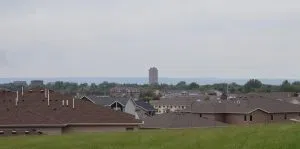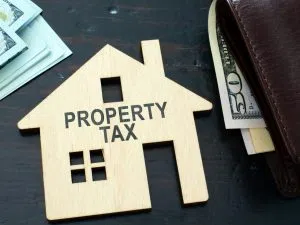
The North Dakota Capitol looms over a sea of new residential developments in north Bismarck. (Mary Steurer/North Dakota Monitor)
(North Dakota Monitor) -North Dakota residents with questions or concerns about their property tax estimates have a few weeks to say their piece before local governments finalize their budgets.
County treasurers are required by law to send the tax estimates to property owners with anticipated property taxes of $100 or more by the end of August each year. The treasurers prepare those estimates based on local governments’ budget proposals.
Local governments hold public hearings on their proposed budgets and tax plans between Sept. 7 and Oct. 7.
Each property tax estimate includes information for residents on when and where their local public hearings are happening, so taxpayers have an opportunity to weigh in.
Rep. Mike Motschenbacher, R-Bismarck, said the local level is usually the best place for residents to direct concerns about property tax increases.
“I tell people all the time, ‘You got to go to your county commission meetings, you got to go to your city commission meetings, you got to go to your park district meetings,’” he said. “Those are the ones that actually levy the taxes.”
The Forum of Fargo-Moorhead reported that only one speaker attended the Sept. 10 public hearing for Fargo Public Schools’ proposed property tax levy.
The property tax estimates include basic information like the property’s assessed value, as well as listing the mill levy applied to the property.

The mill levy is part of the equation that assessors use to determine property taxes. While it’s sometimes criticized as a confusing way of calculating property taxes, it can help property owners identify how their taxes have changed.
The tax estimates also include a line item of how much legislative tax relief a taxpayer has received — a part of the notice that’s often overlooked, said Motschenbacher, a member of the Legislature’s interim Taxation Committee.
Motschenbacher said he started carrying his property tax statement with him everywhere he goes so he can help constituents better understand how their property taxes are calculated and which governing bodies their taxes support.
While most property tax decisions are made locally, residents should also feel free to talk to lawmakers, too.
“Don’t be afraid to call and talk to your legislators,” he said. “But also, don’t be afraid to go sit in front of a city commissioner or county commission meeting and let them know your grievances. They’re gonna listen.”
North Dakota voters will soon decide on a proposal that, if approved, would drastically change the state’s property tax system.
The November ballot includes a measure to eliminate property taxes based on property valuation. It would require the state to reimburse local governments by an amount equal to the property taxes they levy for the 2024 tax year.
Lawmakers recently approved a cost estimate that ballparked the financial impact of the measure at roughly $3.15 billion for the 2025-2027 biennium.









